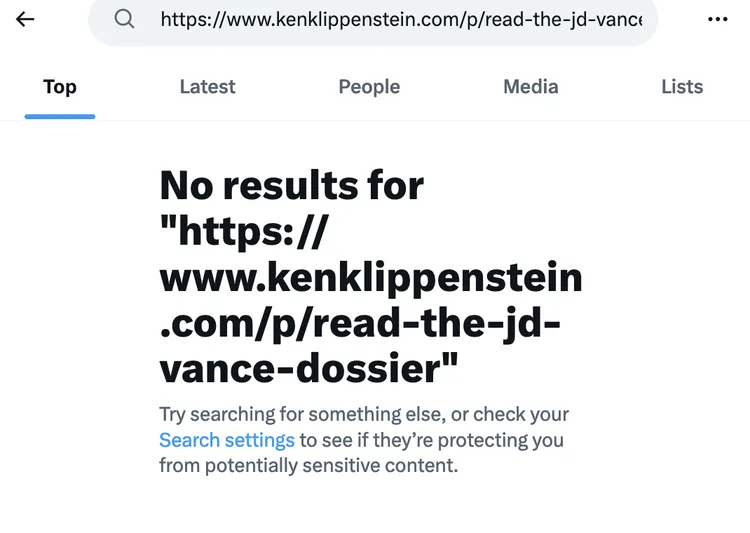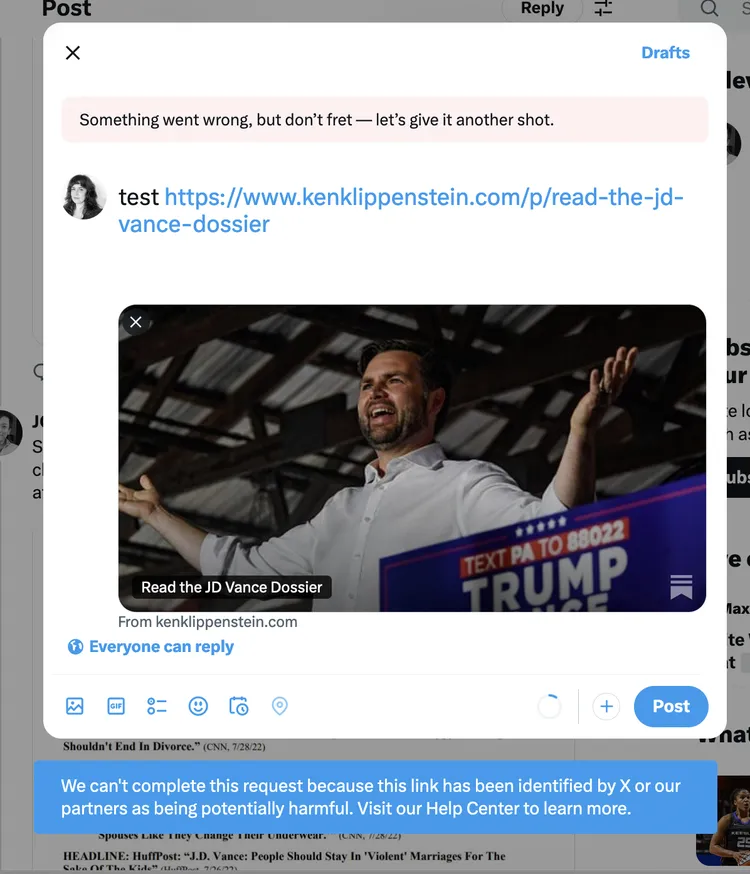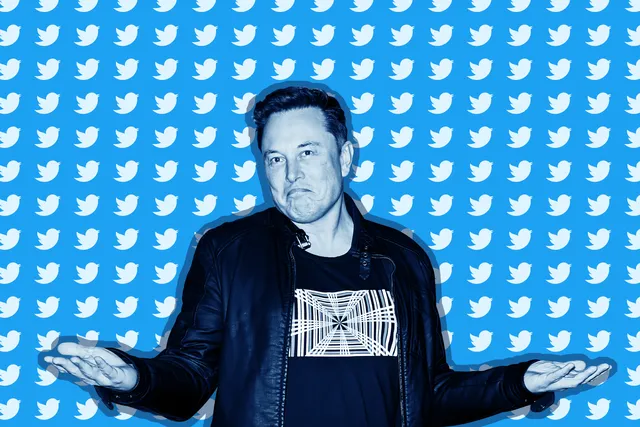And suspends the journalist who published it.
In a controversial move, X (formerly Twitter) has taken action to block users from posting links to a newsletter that allegedly contains hacked documents related to the Trump campaign’s research on vice presidential candidate JD Vance. The newsletter, written by investigative journalist Ken Klippenstein, has caused quite a stir—not only because of the sensitive information it reportedly contains, but also because Klippenstein himself has been suspended from the platform.
Attempts to search for posts containing the newsletter link yield nothing, as X has scrubbed the platform of any such content.

The Alleged Hack and its Fallout
The document in question is said to have originated from an Iranian hack of the Trump campaign. Despite the gravity of the claim, major media outlets that received the same material declined to publish it. Klippenstein, however, took a different route, publishing it through his newsletter, KlipNews. According to Klippenstein, the document was provided to him by a source identified only as “Robert,” who notably uses an AOL email address—a detail that adds a layer of intrigue to the situation.
Contained within the document are what appear to be JD Vance’s full name, addresses, and a partial Social Security number. The leak of such personal information has escalated concerns about privacy violations, even as many speculate about the political implications of the hack.
X’s Response: Suspensions and Censorship
X quickly moved to suspend Klippenstein’s account, citing violations of the platform’s rules regarding the posting of unredacted personal information. In a statement via its safety account, X confirmed that Klippenstein was “temporarily suspended for violating our rules on posting unredacted private personal information.” However, X has remained tight-lipped on why links to Klippenstein’s article have been categorically blocked across the platform.
The official X account for KlipNews corroborated the reasoning for Klippenstein’s suspension, stating, “Ken Klippenstein has been banned by Twitter for publishing private information in contradiction of its rules.” However, this hasn’t answered the broader question: why is X completely blocking access to the newsletter itself, preventing links from being shared?
X’s Complex History with Hacked Materials
This isn’t the first time X has found itself in a heated debate over hacked materials. Prior to Elon Musk’s acquisition of the platform, Twitter had a strict policy prohibiting the posting of hacked content. This policy was notably invoked when the platform banned links to a New York Post story about Hunter Biden in 2020, sparking widespread controversy.
Following the backlash, Twitter revised its stance, with then-CEO Jack Dorsey admitting, “Straight blocking of URLs was wrong, and we updated our policy and enforcement to fix it.” Dorsey’s about-face led to the unblocking of the New York Post story and a more relaxed approach to similar content moving forward.
Elon Musk, who has been vocal about his dissatisfaction with Twitter’s past censorship decisions, criticized the handling of the Hunter Biden story in 2022. “Suspending the Twitter account of a major news organization for publishing a truthful story was obviously incredibly inappropriate,” Musk tweeted, signaling his disapproval of how the platform previously managed such issues.
In an ironic twist, Musk later invited journalist Matt Taibbi to review internal documents related to Twitter’s decision-making process during the Hunter Biden incident. Taibbi’s exposé revealed interesting details but also resulted in him inadvertently sharing the private email addresses of both Dorsey and U.S. Representative Ro Khanna.
X’s Silence Raises Questions
So, why has X reverted to blocking access to Klippenstein’s story? The answer remains unclear. Despite Musk’s previous criticism of URL blocking, the platform seems to be repeating history. Several staffers at The Verge attempted to post links to Klippenstein’s newsletter and were met with an error message: “We can’t complete this request because this link has been identified by X or our partners as being potentially harmful. Visit our help center to learn more.”
This development raises new questions about X’s evolving stance on hacked materials and sensitive content. While the company insists that Klippenstein’s suspension is due to privacy violations, it has yet to explain why users are being blocked from linking to the newsletter itself.
As X navigates the complexities of free speech, privacy, and political discourse, its decisions will likely continue to provoke debate—especially under Musk’s leadership, which has promised to champion transparency and openness. Yet, with Klippenstein’s suspension and the suppression of his story, many are left wondering where the line is now drawn.
For now, it seems that X’s handling of hacked materials remains as murky as ever.











